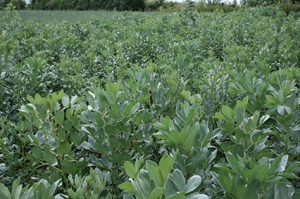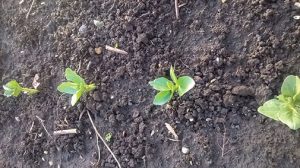Broad beans are a national favourite, grown here for thousands of years, so much so that they are part of our language. If you’ve got lots of bounce, you’re ‘full of beans’, and if you’re down on your uppers, you’re not worth a bean.
The broad bean is the only outdoor crop worth sowing this month, although March sowings are less risky. The most frost hardy early broad bean is Aquadulce. Early spring is the best time to start beans and peas, you can plant as late as June, but the yield will be low. They do take up a lot of space, and grow high, especially the ‘Green’ varieties.
Plant your beans 2” deep when the soil isn’t waterlogged in 24” rows, at a spacing of about 6”. If you plant too close, the plants will look good but few pods will set fruit. The plants tiller out as they grow, sending out several secondary stems, all of which flower and set fruit.
Crows, badgers and mice will all eat your newly sown beans, so cover with netting or fleece, or sow indoors in seed trays and transplant, again under netting.
Lush soil will keep the plant strong and healthy. If you don’t use slug pellets then you will have lots of ladybirds and ants, which like eating blackfly. If it is very dry at flowering time, watering the soil will increase fruit set of the flowers.
Blackfly can be a megapest in June. As soon as there are lots of flowers nip out the growing tip of the plant, which is where they first alight. At this point keep an eye out every day, and cut off any infested lengths of stem. Blackfly don’t much care for soapy water, but generally survive it. Early plantings, in November or February, are generally well in flower before blackfly are on the wing.
When they grow tall and have huge heavy pods of beans, they will need support. A stake at either end of each row (much easier to tap in when the soil is wet) with twine between will do the job, perhaps with bamboos at intervals to hold the twine if you have a long row. The shorter variety The Sutton, at 75 cms, may get you out of this task.
The taste of the beans changes every day as they mature, tasting milder as they swell and eventually quite starchy, at which stage they are good for drying. Leaving a couple of plants until they begin to go black will provide next year’s seed, although you may get a mixed variety if there are other beans nearby.
And what is the strongest vegetable? The muscle sprout.
To sow this month
Apart from broad beans, only indoor sowings this month, and even those do better with the heat of a propagator, especially tomatoes and peppers. Lettuce, true spinach, beetroot, early potatoes and peas can be sown, and will do best kept under fleece.






